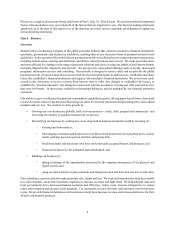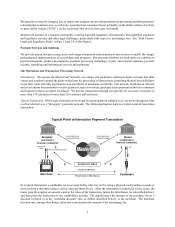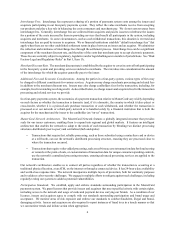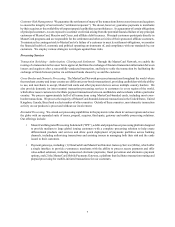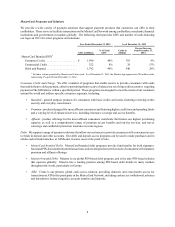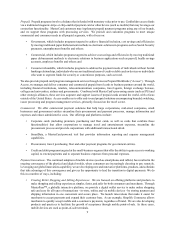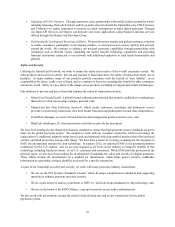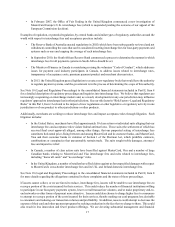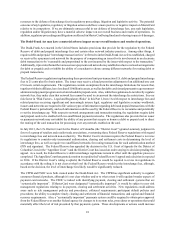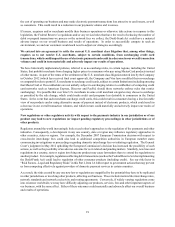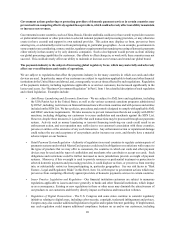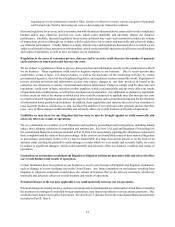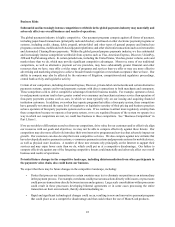MasterCard 2013 Annual Report Download - page 18
Download and view the complete annual report
Please find page 18 of the 2013 MasterCard annual report below. You can navigate through the pages in the report by either clicking on the pages listed below, or by using the keyword search tool below to find specific information within the annual report.14
Interchange Fees. Interchange fees associated with four-party payments systems like ours are being reviewed or
challenged in various jurisdictions around the world. Examples include:
• legislation to regulate interchange fees (such the Dodd-Frank Act in the United States and the legislation
proposed by the European Commission in July 2013);
• competition-related regulatory proceedings (such as the European Commission's December 2007 decision
restricting our cross-border interchange fees, which is pending appeal, as well as proceedings in several
jurisdictions, including several European Union member states);
• central bank regulation (such as in Australia); and
• litigation (such as the merchant litigations in the United States and private lawsuits in Canada and the United
Kingdom).
For more detail, see our risk factors in “Risk Factors - Legal and Regulatory Risks” in Part I, Item 1A of this Report
related to interchange fees and related practices receiving significant and increasingly intense legal, regulatory and
legislative scrutiny worldwide, and the Dodd-Frank Act. Also see Note 18 (Legal and Regulatory Proceedings) to the
consolidated financial statements included in Part II, Item 8.
No-Surcharge Rules. We have historically implemented policies in certain regions that prohibit merchants from charging
higher prices to consumers who pay using MasterCard products instead of other means. Authorities in several
jurisdictions have acted to end or limit the application of these no-surcharge rules (or indicated interest in doing so),
including the Reserve Bank of Australia (the “RBA”) and the Canadian Competition Bureau (the “CCB”). Additionally,
pursuant to the terms of settlement of the U.S. merchant class litigation, in January 2013 we modified our no-surcharge
rules to permit U.S. merchants to surcharge credit cards, subject to certain limitations.
Data Protection and Information Security. Aspects of our operations or business are subject to privacy and data
protection regulation in the United States, the European Union and elsewhere. For example, in the United States, we
and our customers are respectively subject to Federal Trade Commission and federal banking agency information
safeguarding requirements under the Gramm-Leach-Bliley Act that require the maintenance of a written, comprehensive
information security program. Regulatory authorities around the world are considering numerous legislative and
regulatory proposals concerning privacy and data protection. In addition, the interpretation and application of these
privacy and data protection laws in the United States, Europe and elsewhere are often uncertain and in a state of flux.
See our risk factor in "Risk Factors - Legal and Regulatory Risks" in Part I, Item 1A of this Report related to regulation
in the areas of consumer privacy, data use and/or security.
Anti-Money Laundering. MasterCard is subject to anti-money laundering (“AML”) laws and regulations, including
the regulatory requirements of Section 352 of the USA PATRIOT Act. We have implemented a comprehensive AML
program designed to prevent our payment network from being used to facilitate money laundering and other illicit
activity. Our AML compliance program is comprised of policies, procedures and internal controls, including the
designation of a compliance officer, and is designed to address these legal and regulatory requirements and assist in
managing money laundering and terrorist financing risks.
Economic Sanctions. We are subject to regulations imposed by the U.S. Office of Foreign Assets Control (“OFAC”)
restricting financial transactions and other dealings with Cuba, Iran, Syria and Sudan and with persons and entities
included in OFAC's list of Specially Designated Nationals and Blocked Persons (the “SDN List”). Cuba, Iran, Syria
and Sudan have been identified by the U.S. State Department as terrorist-sponsoring states. We have no offices,
subsidiaries or affiliated entities located in these countries and do not license financial institutions domiciled in these
countries. We have established a risk-based compliance program that includes policies, procedures and controls that
are designed to prevent us from having business dealings with prohibited countries, individuals or entities. This includes
obligating issuers and acquirers to screen cardholders and merchants, respectively, against the SDN list.
Banking Agency Supervision. We are or may be subject to regulations related to our role in the financial industry and
our relationship with our financial institution customers. Certain of our operations are periodically reviewed by the
U.S. Federal Financial Institutions Examination Council under its authority to examine financial institutions' technology
service providers.


